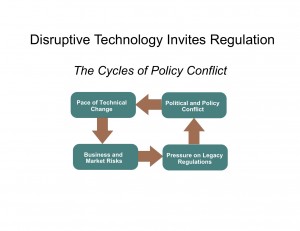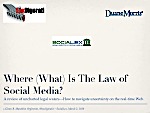Several of the previous posts in my The Law of Social Media essay series focus on core legal issues, such as copyright in user-generated content and employer use of social media for HR decisions. This one is a bit different. Like John Naisbitt, it describes what I am convinced are the most significant law/policy “megatrends” affecting the social media space today.
As an overview, consider the following scenario—and click for a larger image:

As the graphic indicates, the reality is that disruptive technologies quickly and visibly invite governmental regulation. That’s because change creates business and policy risks, which threaten legacy products and powerful business incumbents, and in turn which cause political pressures to protect established constituencies. Since social media is most assuredly a disruptive force, this circular pattern will likely manifest itself — in fact, as I discuss below it already has — in public policies towards social media and social networking communications.
1. Censorship & Filtering
Governments absolutely hate “unfiltered” social media and will move to censor and control it.
In the East, the basis for such censorship is political and religious oppression, as in Iran, North Korea, China, etc. In the West, the more unlikely culprit has been intellectual property (e.g., music and movie copyrights) and obscenity, as in Australia, France and New Zealand’s efforts to install country-wide porn filters and institute a “the strikes” rule against P2P file sharing. And everywhere, government mourns the loss of the historic financial and advertising basis for traditional media like newspapers and broadcast television, proposing to bail out or subsidize the latter in order to prevent social media from achieving dominance at the expense of last century’s communications technologies. Censorship is far from dead on the Web; in fact, it’s really only beginning.
2. Privacy
The EU’s strict data protection (privacy) regime will spread and overtake the US opt-out approach.
Most everyone knows that the European Union has a highly protective scheme of individual privacy in the digital age. Fewer understand that in the United States, with the exception of specially regulated industries like health care and financial services, the only privacy protections available are basically those the Constitution provides as against the government. That will change, however. The EU is too large a market for businesses to overlook, commerce today is fully globalized and while the United States remains the least privacy-centric of any major industrialized nation, that is changing as legislators and regulators more often choose an opt-in requirement for newer, albeit still infrequent, electronic privacy measures.
3. Criminal Law
Cyber offenses will (finally) be created.
In the past, criminal violations involving the Internet and online activities have largely focused on corporate interests, like the Anti-Cybersquatting, CFAA and CAN-SPAM Acts. But the current proliferation of pedophilia, cyber-bullling, stalking and other socially offensive digital-centric conduct is different. Many times, existing criminal laws — for instance, of assault — are not broad enough to cover online conduct. Other time, prosecutors are reluctant to indict and juries even more reluctant to convict. Yet the US congressional approach to indecency on the Web has for more than a decade been to attempt to ban conduct deemed seedy, whether pornography or gambling, to avoid having the “new” media infected with perceived old evils, for instance the Communications Decency Act of 1996. As a result, there is a good chance, well above 50% in my estimation, that the next several years will bring a proliferation of state and federal laws making criminally unlawful specific forms of online activity deemed socially deviant or harmful.
4. Anonymity
Anonymity on the Internet is under assault and may be lost.
A timely prediction, given that just yesterday two different courts compelled the unmasking of anonymous commenters in civil pretrial discovery—when the posters were not even parties to the cases. Ninth Circuit Upholds Unmasking of Online Anonymous Speakers and Illinois Appellate Court Unmasks Anonymous Commenters. There are a variety of reasons, but the principal one is that by defeating anonymity, politicians can be seen as “protecting” the victims of Web-based schemes, involving both antisocial (i.e., bullying, extortion, etc.) and anti-consumer (i.e., stock pump-and-dump chats, etc.) behavior, which sometimes end quite tragically, as in teenage suicides. This is reinforced by the continuing efforts of copyright holders (music, photos, video, news) to require ISPs to disgorge the identities of infringing users and by the FTC’s sponsored blogging “guidelines,” which support the theme of transparency from a consumer protection perspective. Almost alone among nations, only America has a Tom Paine and Federalist Papers/Primary Colors tradition of anonymous or pseudonymic political speech, yet even here — unless the Supreme Court intervenes — short-term passions, politics and national security phobias almost always trump free speech. The old proverb was that “No one knows if you are a dog on the Internet.” Don’t plan on barking much longer!
5. Competition
Competition and antitrust laws will reshape social media providers.
My core training is in antitrust law, although this megatrend has little to do with yours truly. Instead, it stems from the reality that Facebook, Apple and Google, among others, are already facing competition law investigations in the advertising, mobility, search and handset markets. From an economic perspective, there are very strong, positive network effects in social media, far greater than were true in the 1990s for Microsoft’s WIndows OS. As a consequence, viral expansion leads to small social media companies getting VERY big VERY fast: witness Facebook’s 500 million users and Twitter’s phenomenal hockey-stick growth curve. It is difficult for entrepreneurs to shake the old underdog mentality even when their companies become big enough that market power makes their business practices and acquisitions suspect, as Mark Zuckerberg is now learning to his chagrin. And when fueled by financial underwriting from legacy competitors — the dark political underbelly of Washington, DC and Brussels, Belgium antitrust battles — the “nascent” stucture of social media and wireless markets has, to date, not proven sufficient to keep the mitts of antitrusters from the US Department of Justice and the EU’s Competition Directorate from meddling—e.g., Google/Yahoo (2008-09) and Oracle/Sun (2009-10), to name a couple of examples.
6. Location
Location-bsed services will spawn a host of new policy battles.
“Location, location, locations” is not just a real estate slogan, it’s the cross-hairs for a number of policy trends affecting social media. The indicia are not found not just in the geometrically increasing popularity of geo-tagged photos, location check-in apps and games, and the like, but as well and perhaps more importantly in the fact that as wireless communications and data come to dominate telecom — a direct consequence of social networking — regulatory oversight follows almost automatically. “Nomadic” services like VoIP and video chart (e.g., FaceTime), in contrast, present an equally great threat to the established order by making location a matter of indifference. At bottom, this is an industry where eyeballs and advertising dollars still rule. So as marketers devise ever-clever ways to monetize users’ location (including the launch this week of my client shopkick’s location marketing app) all of the bad stuff that can happen online is bound, eventually, to arise with respect to location-based services. LBS isn’t bad; some people are bad. Unfortunately for the FourSquares and Gowallas of the social media world, that has never been enough in most societies to stop gun control—and it won’t be enough to arrest the coming push for consumer protection and marketing regulation in the location services space.
Note: I first used the “megatrends” metaphor while presenting at the 140 Characters Conference-DC (#140onf-dc) in June 2010, and am indebted to organizer Jeff Pulver for serving as my muse for these thoughts. Thanks, Jeff!






